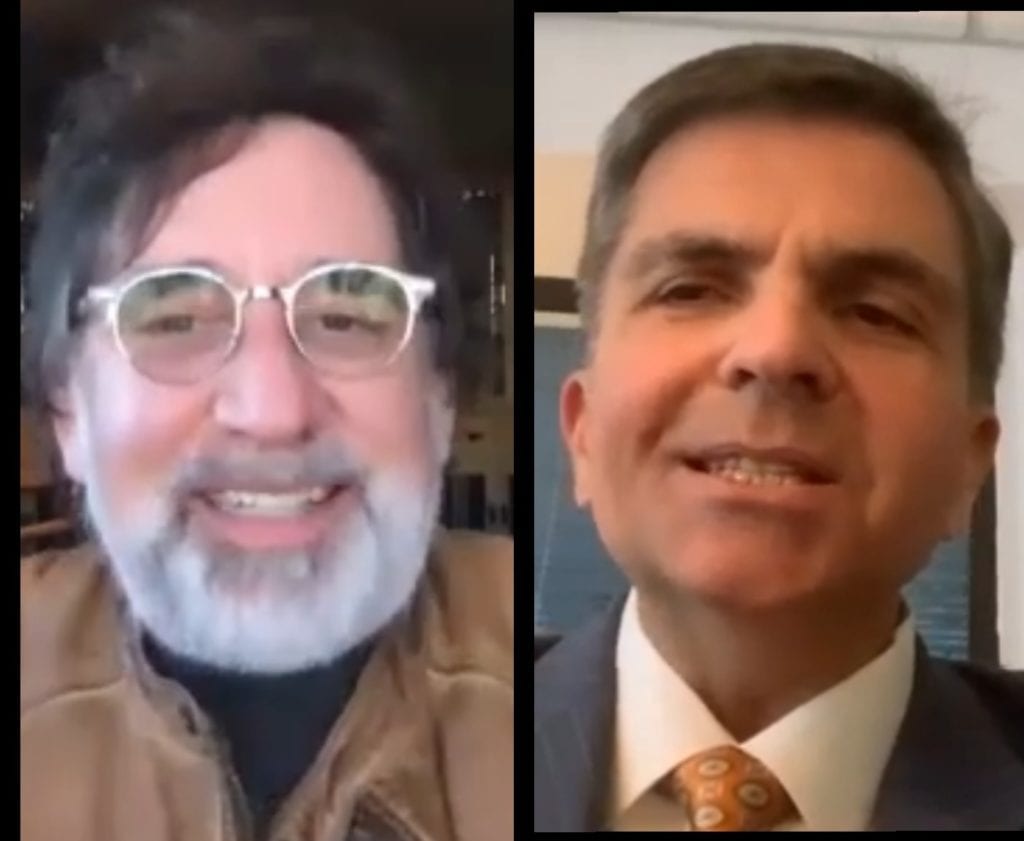(Soundcloud audio here)
Tooley: Hello this is Mark Tooley, president of the Institute on Religion and Democracy here in deserted downtown Washington, DC, with the pleasure today of talking to pastor Brian Zahnd, who is the founding pastor of Word of Life Church in central Missouri, north of, well he’ll have to tell me geographically.
Zahnd: North of Kansas City. Just say Kansas City area.
Tooley: Excellent, and has been there as the founder since 1981. So, a long and successful pastorate. He’s also the author of many books. And occasionally, I have the pleasure of being a sparring partner with him on Twitter, challenging his perspectives on issues, especially regarding war and peace and Christian pacifism. So, he’s very gracious to come on for this conversation. So, thank you, Pastor, Brian Zahnd.
Zahnd: My pleasure, Mark.
Tooley: Now I’m going to describe you theologically as I perceive you, and you can correct me.
Zahnd: Okay, I’ll be happy to.
Tooley: You are a Christian pacifist. And I assume that you’re theologically aligned to some extent with Stanley Hauerwas and John Howard Yoder. And you would believe that it’s central to the gospel of Jesus Christ that followers of Jesus reject violence in all of its forms, including violence by the state, including all war, and including, although you can correct me, violence to the states, so judicial and police functions. Is that anywhere close to accurate?
Zahnd: Let’s see. Maybe half accurate. So, let me respond to that. I am very influenced by Stanley Hauerwas and then also John Howard Yoder, but I’m tremendously influenced by Stanley Hauerwas, there’s no debating that. Second thing that I would correct, or the first thing I would correct, is I make a distinction between waging a war and police function. And I think, and so no, I support a police function. I think it’s necessary within a healthy society. I understand that in dysfunctional societies that the distinction between waging a war and police function can become blurred. But unhealthy societies, there’s a vast difference between the two. The other thing I want to say is I’m very clear in my writing, I mean, it shows up in my books, that I do not call myself a pacifist. Now, this may be me trying to be a little too cute, but the fact is I don’t call myself a pacifist for a couple of reasons. First of all, well this is the most important, but this is one reason I’ll mention is too easily people confuse the word pacifism or peacivism with being passive. I don’t think Christ has called us to a passive position as we engage with this world, but that’s a lesser reason. More significantly, passivism is an ethical position regarding violence that people can adopt independent of Jesus Christ, and many have done so. That doesn’t describe me for most of my ministry. I have been quite comfortable with the idea that waging war is compatible with Christian discipleship. It’s only been since about 2004, so about 16 years, that I’ve had a change of thinking about that. I don’t describe myself as a pacifist, I simply say I’m seeking to be a follower of Christ. Now, let’s have the discussion about how Christ informs us on violence, and particularly war. So that would, I think, I mean, Hauerwas will call himself a pacifist. I don’t. And I’ve given you my reason why. So, you’re in the ballpark.
Tooley: Okay, so what shifted you 15 years ago towards more of a position of non-violence?
Zahnd: Reading and a mystical experience. I began to be tremendously influenced by Stanley Hauerwas and N.T. Wright, who wouldn’t call himself a pacifist. I don’t call myself that either. But I think N.T. Wright, a renowned New Testament scholar and theologian, I don’t think he would take it as absolute stand as I take regarding the compatibility of Christian discipleship and waging war. But he’s a general critique of the way Christians too easily embrace the wars of their nations, and especially the empires. I also had a mystical experience in 2004 when I was in prayer. As I describe it, sitting with Jesus, kind of a contemplative exercise, and a scene was replayed in my mind from the First Gulf War. And this is way back. That’s like what ’91? I forgotten the dates now. And I remember the day leading up, there’d been the staging and Desert Shield, but everybody knew that this was actually to become a war. And this is pre-internet. And I remember I had the radio on in my study at church, and I was very excited about this. And we think the war is going to begin. And this was something unique because it was the first time that war was live on television, right. It’s what made Wolf Blitzer famous. And I remember going home, ordering pizza, and inviting friends over, and we watched war on TV, much as one might watch the Super Bowl or some sporting event. I had forgotten all about, I hadn’t thought about that that wasn’t, it was just the thing that happened. And then what would be 13 years later, I had this moment where that was replayed in my mind. I’d completely forgotten it as a kind of incriminating surveillance video, and Jesus expressed to me that that impact was a sin. And I think whatever your position on war is, I don’t think any Christian is going to say you want to view it as a means of entertainment. But that moment of clarity, of seeing the casual approach I had the idea of war, caused me to begin to rethink quite deeply and read seriously. And I sort of surprised myself when I was writing something one day and found myself saying that I would be unwilling to take up arms in the name of the state. And I didn’t even know that until I wrote it. Not at all. I believe this now. And so, that’s one version of how I can tell the story. It’s a fairly complex, long journey, but I’ve just wanted to state that for many years I was quite happy to celebrate American military adventures around the world, and just felt like somehow God is on our side, and we’re a great force for good in the world. And that’s why we need a trillion-dollar war machine, etc. So, this is later in life. I’m 61. Now this was about when I was 45. So, this was a later in life change. So, that’s a little bit of the story.
Tooley: Well, I appreciate that history and clarification. There are some who call themselves Christian pacifists, including Dr. Hauerwas, yes, who would reject not just war, but also say that Christians cannot serve in the judiciary, or in law enforcement, or perhaps even any form of government.
Zahnd: Not sure that Hauerwas says that. Maybe, but I’m not sure. I’m fairly well-read with him, and I don’t know that he says that, but maybe. Greg Boyd says that. Greg Boyd is a friend of mine, and that’s his position.
Tooley: He says that. I think my friend Ben Witherington at Asbury has even said that. But the response to that would be well, if you’re using lethal force as a police officer, how is that morally distinct from a soldier also using lethal force in the pursuit of some form of justice or in the defense of the innocent to some extent.
Zahnd: Well in war, the purpose of killing is to kill. It is not the purpose of a police force within a civil society to kill. It may reach that point where there may be violence necessary to disarm, or disable, or stop a violent predator. But for example, here in my city, in St. Joseph, Missouri, if a policeman tonight fires his weapon in the course of duty, there’ll be an entire investigation. This is nothing like war, which is organized killing on a mass scale. So, I’m trying not to slip into Christian anarchism, that is actually a thing. And it’s not Christian vandals that you understand. It’s Christians that simply want to have nothing to do with the apparatus of state. I’m uncomfortable with that. I want Christians to be able to participate in public life, whether it’s a school teacher, or a sewer worker, or my father was a judge, my brother is the prosecutor in North Kansas City, and so I grew up in a legal family and a family that was involved in law and justice. I have great respect for it, but I simply think that if we’re looking at the New Testament and the early church, the pre-Constantine church, that waging war is not something Christians are called to participate in.
Tooley: And so, what would you do with the Just War tradition, which is influential in almost all of the major Christian communions in their history? And also, more recently, what’s called “responsibility to protect,” which, as I understand it, some Christians would say that they’re not just for, but responsibility to protect in terms of protecting the innocent with lethal force is justified.
Zahnd: No, I’m not an Augustinian Just War theorist. I would welcome Christians embracing that because I think it’d be a massive step in the right direction, because there are very few wars that rise to the level of truly Augustinian Just War. It rarely happens, okay. There would be very few examples. World War Two becomes complicated. And maybe, I figure that will come up at some point. But so, what was the other question?
Tooley: Well I think, more recently, perhaps, that many in the Catholic, the current teaching strategy of Pope Francis, for example, is away from Just War that would affirm, as I understand it, the responsibility to protect in terms of using lethal force to protect the innocent.
Zahnd: Perhaps. I don’t know. I’ll say this, the language we use if Pope Francis is saying this, well, first of all, the church doesn’t have troops. Now, to what degree I would advise the state not to involve themselves in war of any kind, for any reason to defend and all of that, but I don’t know. But I simply acknowledge that I belong to another kingdom. I do have engagement with this world, but my allegiance is pledged to another kingdom. The other problem is all wars are waged defensively on both sides. Now, an objective observer from outside may say no, here’s an aggressor. But that is not how it plays out in the minds of real people in real time ever. I mean, Germany invaded Poland because they were defending German citizens in Poland. So, they see it as a defensive move. And so, once you say okay no war is acceptable if we are defending, that’s not going to stop anybody’s war, including German aggression and World War Two because they saw it as initially defending German citizens abroad, and then defending the homeland. And I think that’d be my response.
Tooley: But, as you recall the Persian Gulf War, the Iraq invasion of Kuwait, Saddam Hussein may make that claim that it was defensive, but it was a pretty disingenuous claim wasn’t it?
Zahnd: I think so, yes. I mean, I’m not here to defend Saddam Hussein. I’m just saying American military engagement in Iraq has not left the world a better place. I mean, if the goal was to make the world a better place, I think almost everyone would agree that American military adventurism in the Middle East has just made it worse.
Tooley: Do you believe that?
Zahnd: Having said that, I’m not advising the United States government. I am speaking to Christians, and I’m saying we are pledging our allegiance to another kingdom. What the kingdoms of this world do regarding war or not war and how just it is or isn’t, I mean, I’m willing to kind of critique that and speak to it. But ultimately, I say that doesn’t pertain to the baptized. The baptized now belong to another kingdom that is a peaceable kingdom that doesn’t have armies and doesn’t wage wars.
Tooley: Should the baptized on their list, on their menu, of concerns have regard for nation states, and should the baptized be patriotic in any sense?
Zahnd: If by patriotic, we mean a pride of place that lends itself to a responsible citizenship, sure. But if by patriotism, we mean a sense of allegiance to a particular nation state that is sufficient and enough for me to be motivated to take up arms against other people, then I think it’s outside the bounds for Christians. And although I know, I’m keenly aware that this is a very minority position particularly in the United States of America among Christians, you can have the argument whether it was 100% universal. You cannot have the argument that it was nearly the universal position of the early Christians that they simply could not engage in war. It was just, that’s the position. That’s how the church felt about that. They didn’t say that they didn’t want Christians to join the military, but they understood that many soldiers came to faith in Christ as soldiers then as now. In the case of the Roman Empire, the army was so interwoven with all of society. They weren’t always just waging war. They’re also constructing roads and building bridges, and also essentially functioning as a police force. And so, the church didn’t say upon your baptism, you must leave the Roman legions. What they said is you must not kill, even in battle. You can stay in the army. You just can’t kill. And that was their position, whether we like that, whether we adhere to that, whether we agree with that, I think the one thing we have to admit, if we’re going to engage in an honest conversation about this, is this was the general disposition of the church for 300 years.
Tooley: It seems like if I’m recalling correctly, Peter Leithart’s book Defending Constantine contests that point. Do you recall this book?
Zahnd: I have talked to Peter about this in person. Yes.
Tooley: Have you persuaded him otherwise?
Zahnd: I don’t know that I have persuaded him. My response to Peter Leithart’s Defending Constantine would be Alan Kreider’s The Patient Ferment of the Early Church. And I won’t try to repeat the argument, but I made it my book of the year whatever year it came out, maybe three or four years ago. The Patient Ferment of the Early Church. And Peter Leithart, who I respect as a committed Christian and follower of Christ. His ultimate argument, and we went back and forth on this publicly in Wichita, he said he simply could not conceive of Christianity existing or surviving without a Christian emperor. Which I found astounding since it had already survived for three centuries and was growing, and was somewhere between 10 and 14% of the population at that time. And so, I just think his argument is ultimately flawed. I understand it. I understand that at least through much of Christianity, a majority of the church would adhere to it, but the move towards Constantine in Christianity I regard as a mistake. I’m not here though to cast stones, because I think it was in an editable mistake. I just think there was no way that in, let’s say, the year 320 that some people are talking in Milan and they say, “I hear that the new emperor is some sort of Christian.” That they’re going to say, “Well, we’re not going to put up with that.” I mean, I think it was inevitable. But what happens is that puts the church on a trajectory where 16-17 centuries later, you have the horrendous phenomenon of millions upon millions of baptized Christians killing millions and millions of baptized Christians in the name of national legions. And something has gone wrong there.
Tooley: Do you believe that Christians today can serve in the armed forces of the United States, or of any nation?
Zahnd: Well, of course they do so. So can they do so. I’ve never confronted someone and said, “You should not be a soldier. You should not be in the military.” I have been contacted by literally dozens of people, often career military officers, who said after reading my book A Farewell to Mars, they decided to resign their commission, leaving the military, and pursue another line of vocation. So, I welcome those kinds of stories. That’s happened over and over and over. We encounter Christ where we are. When we are. And so, it isn’t a thing for me to go around saying, “You can’t be a soldier, or you must not.” I mean, I have people in my own church that joined the military. They come up to me and I pray for them as they’re leaving for their basic training. So, I mean, it’s not a secret that Brian Zahn believes that waging a war is incompatible with faithful discipleship of Jesus Christ. But I, as a pastor, understand we live in a complicated world. And so, I’m not here, I’m certainly here to, prophetically as I can, critique what I would call the masters of war and the principalities and powers, but I never direct at the soldier on the ground sort of situation.
Tooley: Well, obviously the United States, but all nation states to some extent, rely upon their own armed forces and the resort to lethal force if perceived as necessary. That being the case, do you believe Christians should be engaged in the politics of nation states? As in, should Christians vote for candidates who are going to win an office and use lethal force to the armed forces or by other means?
Zahnd: Fantastic question. And I have answered it variously for the last 16 years. I have had shifting opinions on this. I have been through periods of time where I would vote in local elections. I would always go to the polls. And let’s say for president I would write in Bob Dylan, or Wendell Berry, or tree beard, or something like that, specifically because I didn’t want my vote to be construed as authorizing someone to wage war on my behalf. But then I began to shift and say, okay, I’m going to vote toward who I think in my conscience, hopefully bathed in prayer, will do the least harm. So, I’m not looking for some iteration of Caesar to bring about the kingdom of God. That’s impossible. The idea of truly I mean, can a person really be president and live as a Christian simultaneous is very difficult. And I appreciate the fact that Barack Obama was asked about that during his campaign for his first election. So, this would have been like in 2008. Did he think he could, I don’t remember exactly how the question was framed. It would have been something like “Can you govern according to the Bible?”. And he said, “I don’t know. I don’t think so.” He said, “Because if I read the Sermon on the Mount seriously, the first thing I might want to do is abolish the Pentagon.” And he was widely criticized by evangelicals for that. I think what you have to say is you appreciate the honesty of that. So, today if I vote at the higher levels of office, I’m really thinking in terms of who will do the least harm. But I really try to have my allegiance to Christ as my politics. And so, here’s where I’m very influenced by John Howard Yoder’s seminal work The Politics of Jesus. I mean, I just think that is such an enormous and important book. I know that Yoder’s legacy is somewhat, definitely, marred by his personal indiscretions and that sort of thing. I’m aware of that. Some of our listeners, viewers may be aware of that. Nevertheless, his work, and that work in particular, is I think it’s just a landmark. It’s very important, and I don’t think you can engage seriously in the rigors of debating the ethics of war in the life of Christ without at least being familiar with that book.
Tooley: Brian Zahnd, pastor and author, thank you for a stimulating conversation. I look forward to sparring with you further on Twitter.
Zahnd: Thank you, Mark.





Comment by Many words saying little on November 19, 2020 at 12:49 pm
This is a great interview, thank your for publishing it.
Sadly, I believe that Rev. Zahnd is on the horns of a dilemma he cannot avoid. He says:
“But if by patriotism, we mean a sense of allegiance to a particular nation state that is sufficient and enough for me to be motivated to take up arms against other people, then I think it’s outside the bounds for Christians.”
However, he also says: “It is not the purpose of a police force within a civil society to kill. It may reach that point where there may be violence necessary to disarm, or disable, or stop a violent predator.”
So, he is essence saying that killing is justified if it is to stop violent people. But Just War criteria is that the purpose of war is to support a just cause, the restoration of peace, morality and justice (my words here).
So to him, just use of violence is okay in micro situations, but not in macro situations. As he says “Well in war, the purpose of killing is to kill.” No it is not. There are multiple examples how some armed forces in the world do all they can to avoid casualties, even resorting to non-lethal weapons at time. So for him violence is a case of ‘beauty is in the eye of the beholder’.
Then, of course he comes out with the ‘trillion dollar war machine’ garbage. Obviously he has not looked at the defense budget of the US military, where the main spending is on paying, housing, and caring for people in service. Many other nations spend their money on the weapons of war and aggressively use it as a tool of national policy.
I have never heard a person holding Rev. Zahad’s position (or any leftist) that attacks Western military spending saying a word about Iran’s military buildup, the use of force by Russia multiple times in the past decade and-a-half, or the aggressive use of force by China in violation of international law. Nor do I hear him condemn insurgency campaigns by other groups or even the use of military force to crush dissent or persecute minorities in other parts of the world.
No, it is the US Military that is an unjust war machine, and has no rights to help defend states for aggressive neighbors or deter the use of force by aggreesive nation-states.
Obviously we as Christians have to make hard choices and demand governments justify their use of military force in a way to re-establish peace and liberty. We also need to demand that after the use of force the people supported do the hard work of making their society more just, something the US government has messed up often in the recent past.
But for Rev. Zahad these things do not matter. There is a point certain that only he and a few can see where violence is ok and when it is not. I do not have the ego big enough to believe I can make those decisions and speak in public about them.
Comment by Donald on November 21, 2020 at 11:20 am
Rev. Zahad – You are able to remain on the horns of this dilemma because, as George Orwell reminds us, “Rough men stand in the dark to visit violence on those who would harm us.” Christians and others who have your predilections can find many other ways to serve this nation that shelters all of us. BUT, you cannot insist that our nation adopt your viewpoint as a national policy.
I wonder if Rev. Zahad applauds President Trump’s actions to remove our troops from the Middle East? Or is he also enough of a theological dilettante that he opposes Mr. Trump because he is a crude man and means all of his policies are therefore corrupt…even though the withdrawal of our forces from the Middle East should be applauded by him.
Comment by Search4Truth on November 27, 2020 at 2:52 pm
Maybe Rev. Zahad should read the words of Alvin York, a WWI Medal of Honor recipient, in explaining how he felt about the number of Germans he killed in the engagement for which he was recognized. I believe that Zahad may be sincere, but he is also looking at this broken world through rose colored glasses and coming off as a simpleton.
Comment by Search4Truth on November 27, 2020 at 2:54 pm
Sorry , Rev. Zahnd. I picked up the misspelling from the previous post.